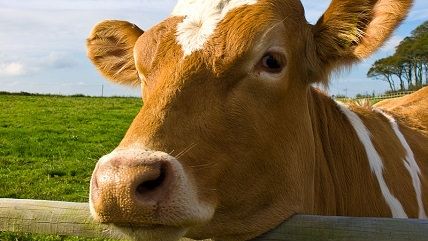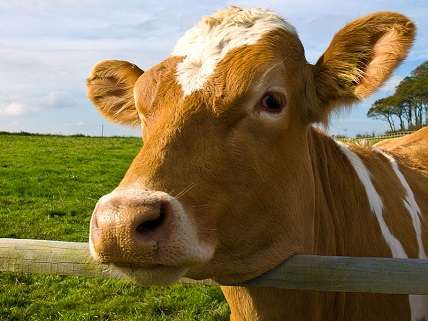First Annual Food Freedom Fest Offers Reasons for Optimism
The Farm-to-Consumer Legal Defense Fund's first annual Food Freedom Fest, which took place last weekend, was a fantastic event.


Last weekend, I had the honor of taking part in the Farm-to-Consumer Legal Defense Fund's first annual Food Freedom Fest. The two-day event, held in Staunton, Virginia, brought together an estimated 200 supporters of food freedom from as far away as California.
FTCLDF, which advocates on behalf of small farmers and their customers on many issues, including the rights of farmers to sell raw milk, billed Food Freedom Fest as "a fun, educational gathering for anyone who celebrates and appreciates freedom of choice in agriculture."
Journalist and author David Gumpert, writing up the event at his blog, described Food Freedom Fest as centered "on overcoming the sense of an expanding, and ever-more-controlling, food regulatory structure."
Speakers at Friday's conference included Rep. Thomas Massie (R-Ky.), whose bona fides include introducing legislation in the nation's capital to legalize raw milk and raising grassfed beef on his Kentucky farm. The event also featured a talk by honoree Joel Salatin, an author, owner of Polyface Farm—located just outside Staunton—and perhaps America's best-known farmer.
Salatin urged the crowd—many of whom have been targeted by government regulations that strangle their livelihoods—to embrace an approach in which they ground their future efforts in optimism. That might appear to be a tough sell. I've taken part in several events geared toward supporters of small farmers, and the constant and excessive regulatory pressure they face tends to mean optimism is in scarce supply.
But Food Freedom Fest was the first such event I've attended in which the optimism Salatin called for was palpable. Several fellow attendees I spoke with by email after the event agreed.
"The food freedom festival gave farmers and activists a glorious opportunity to strengthen our resolve by coming together in honor of the land we love, the farmers we cherish, and the food we cultivate," says Liz Reitzig, a farmer advocate who writes at Nourishing Liberty.
"Food Freedom Fest built a bigger tent for the leadership in the local food movement," says Pete Kennedy, who leads FTCLDF. "[I]t was an event where activists from around the country met, enjoyed each other's company, and rekindled their energy and enthusiasm for the work that lies ahead."
"The food rights movement came of age at this conference," I told Gumpert.
But optimism, while important, only goes so far. There's also the need for vigilance.
"Food Freedom Fest raises our awareness of real threats posed by today's dominant, monopolistic, government-enabled food industry, and catalyzes solutions by highlighting the erosion of our basic rights to eat the foods of our choosing," says John-Mark Hack, executive director of the Local Food Association.
Optimism and vigilance may not suffice. But lawsuits are another tool.
"The Institute for Justice litigates across the country to secure food freedom at the local, state, and federal levels," says Ari Bargil, an IJ attorney who works on the group's Food Freedom Project. "The Food Freedom Festival introduced us to activists, attorneys, and farmers of all stripes, who are all just as devoted to this important cause."
Hack's and Bargil's comments hit home for me this week. After returning from Food Freedom Fest, I spent this past Tuesday at a one-day conference in Washington, DC (comped, just as my ticket to the Staunton event had been), that featured several high-ranking FDA officials discussing enforcement under the Food Safety Modernization Act. The conference made clear that the FDA will be leaning more heavily on small farmers (and others) in the coming years. Those who evinced such optimism in Staunton still have a powerful foe in the nation's capital.
Editor's Note: As of February 29, 2024, commenting privileges on reason.com posts are limited to Reason Plus subscribers. Past commenters are grandfathered in for a temporary period. Subscribe here to preserve your ability to comment. Your Reason Plus subscription also gives you an ad-free version of reason.com, along with full access to the digital edition and archives of Reason magazine. We request that comments be civil and on-topic. We do not moderate or assume any responsibility for comments, which are owned by the readers who post them. Comments do not represent the views of reason.com or Reason Foundation. We reserve the right to delete any comment and ban commenters for any reason at any time. Comments may only be edited within 5 minutes of posting. Report abuses.
Please to post comments


Pretty bad state of affairs when only 200 people showed up for this. Everybody needs to eat, and if there were such a thing as a primary freedom, these guys were discussing it.
Tough for small farmers to travel any appreciable distance this time of year. Those with livestock are cutting and baling hay. Those with produce are busy harvesting and going to market.
"European libraries may digitize books and make them available at electronic reading points without first gaining consent of the copyright holder, the highest European Union court ruled Thursday....
"The directive does not prevent EU member states from granting libraries the right to digitize the books from their collections, if it becomes necessary for the purpose of research or private study, to make those works available to individuals through dedicated terminals, the CJEU [Court of Justice of the European Union] ruled."
http://www.pcworld.com/article.....witterfeed
Pretty bad state of affairs when only 200 people showed up for this.
I imagine the general population is even less aware of food restrictions than other kinds. Besides, so many TOP MEN couch such restrictions in terms of public health, and people eat that shit up. "Gosh, I didn't realize how much sugar soft drinks have! Maybe Mayor Bloomberg was right to call for a limit."
First they came for the smokers, etc.
Food is safe, easy to find, and (somewhat) affordable. Until
/unless one of those three elements changes -people will not care.
The kook fringe will always have something to bitch about. There may be
some niche opportunities for small farms ( upick/roadside/agrotourism) but
most of our daily bread does, and will continue to, come from large farming
operations. If you don't like that you can a) try to change it or b) grow your
own food. I suggest option b. Now, go out side and play but first-CLEAN YOUR PLATE!
That's pretty much it. If foods take a big jump up in price or there are shortages, then you get Arab Spring. The foods that come in for suppression are the ones that were hard to find in the 1st place and that 99.9% of people weren't looking for anyway.
There's not much of a parallel here to liquor or cannabis prohib'n, wherein large #s of people were interested and no close substitutes were legal & readily available.
That alt-text is udderly unacceptable.
my friend's step-mother makes $69 an hour on the laptop . She has been unemployed for eight months but last month her pay was $13667 just working on the laptop for a few hours. find more information....
============= http://www.jobsaa.com
Yeah food sales totally shouldn't be regulated. When enough people die or are poisoned the market will force the bad supplier out of business right? oh i guess not since people aren't allowed to use force. but hey, it will work out because freedom and stuff. Amirite?
Ahh look, a wandering moron.
I live in a state that has a large number of small farms. And many more people grow some of their own, me included. These are not issues occurring here. The cool thing though is that you can (usually) tour any of these small farms. Try doing that at a Purdue, Smithfield or Cargill producer.
I remember 7-8 years ago at the first raw milk pickup here in Miami asking, "So where do you think the police are hiding?" I asked that jokingly, but on the other hand decided not to get my first taste of it there. Now raw milk is sold openly at farmers' markets.
While there are MANY people who've made a difference, I think food freedom is being primarily driven by the market: as there are more buyers, the state has a harder time saying no. It will take regulators some time--and some prodding--to lighten the regulatory burden.
Farmers' markets have been used all over the country to revitalize formerly decrepit downtowns and local officials are typically ecstatic to see their downtowns--where they often work--become the place everyone wants to be. And I'm sure they appreciate the rising property assessments too. If the mayor thinks the beef from the local farmer is the best he's ever eaten (and it probably is), s/he is not going to see that farmer as a potential health hazard.
Great article, Baylen -- Liz says it was a fantastic meet up with everyone. (She wrote about it here: http://nourishingliberty.com/f.....fest-2014/) I'll be there next year and look forward to meeting you and some of my other online food freedom friends. I found you a year or so ago on your own blog. Love your articles on Reason, perfect match.